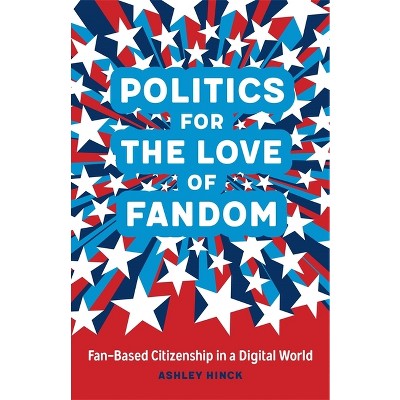About this item
Highlights
- Fandom has been celebrated both as a harmonious, tolerant space and as apolitical and detached from reality.
- About the Author: Hannah Mueller is the managing editor of Diacritics at Cornell University.
- 223 Pages
- Social Science, Popular Culture
Description
About the Book
"Fandom has been celebrated as a harmonious, tolerant space as often as it has been dismissed as apolitical and detached from reality. Yet fandom is neither harmonious nor apolitical. Throughout the past century, fandom has been shaped by recurring controversies, which often determined the future direction of fan communities or sparked the emergence of new circles, platforms, and discourses. Since the earliest days of science-fiction fandom, fans have conceived of their communities as quasi-political bodies, and of themselves as public actors in discursive spaces. Accordingly, they are concerned with the organizational structures, norms, and borders of fandom as well as their own position within the larger public sphere. In the 21st century, this latter concern has moved to the forefront as fan practices and platforms have increasingly been coopted by the entertainment industry and by political actors, forcing fans to situate their fannish and political identities in relation to both sprawling transmedia franchises and right-wing groups exploiting fannish formations for political ends. Through case studies of Glee and The Hunger Games fandoms as well as events such as Gamergate, RaceFail '09, and the controversies surrounding the Hugo Awards, this book explores the complexities of political fandom"--Book Synopsis
Fandom has been celebrated both as a harmonious, tolerant space and as apolitical and detached from reality. Yet fandom is neither harmonious nor apolitical. Throughout the past century, fandom has been shaped by recurring controversies and sparked by the emergence of new circles, platforms and discourses.
Since the earliest days of science-fiction fandom, fans have conceived of their communities as quasi-political bodies, and of themselves as public actors in discursive spaces. They are concerned with the organizational structures, norms, and borders of fandom as well as their own position within it all.
This latter concern has moved to the forefront as fan practices and platforms have been coopted by the entertainment industry and by political actors, forcing fans to situate their fannish and political identities in relation to both sprawling transmedia franchises and right-wing groups exploiting fannish formations for political ends. Through case studies of Glee and The Hunger Games fandoms as well as events such as Gamergate, RaceFail '09 and the Hugo Awards controversies, this book explores the complexities of political fandom.
Review Quotes
"In The Politics of Fandom: Conflicts That Divide Communities, Hannah Mueller deftly adds to our understanding of the darker side of fandom by taking a historical perspective to analyze significant conflicts in fandom history and the impact of those conflicts on the course of their specific fandom's history, as well as the overall trajectories of fandom and fan studies. Through in-depth analysis of these case studies, Mueller crafts sound arguments that simultaneously counter and complicate the general narrative of the progressiveness of fandom and fans. Doing so is necessary for fan studies to better understand fans, fan communities, and fandom by confronting the conflict and negative aspects associated with fans. Fandom is not wholly good or bad, to be celebrated or demonized. Fandom's complexity lies in humanity's complexities. Mueller's work in this book helps us understand how complicated fandom is and always has been in order to assist fan studies address the problems of our world."-CarrieLynn D. Reinhard, Professor, Dominican University
About the Author
Hannah Mueller is the managing editor of Diacritics at Cornell University. Her previous publications include work on the intersections between gender, sexuality and race in contemporary film and television, the representation of incarcerated people in popular media, and the practice of "queerbaiting" as marketing strategy. She lives in Ithaca, New York.Shipping details
Return details
Trending Non-Fiction












